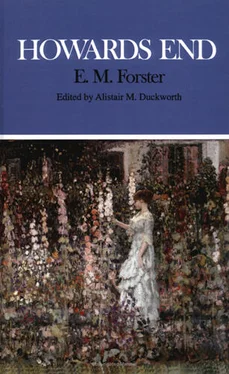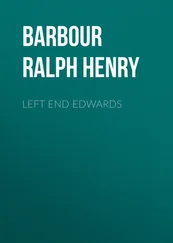Edward Morgan Forster - Howards End
Здесь есть возможность читать онлайн «Edward Morgan Forster - Howards End» весь текст электронной книги совершенно бесплатно (целиком полную версию без сокращений). В некоторых случаях можно слушать аудио, скачать через торрент в формате fb2 и присутствует краткое содержание. Жанр: Классическая проза, на английском языке. Описание произведения, (предисловие) а так же отзывы посетителей доступны на портале библиотеки ЛибКат.
- Название:Howards End
- Автор:
- Жанр:
- Год:неизвестен
- ISBN:нет данных
- Рейтинг книги:3 / 5. Голосов: 1
-
Избранное:Добавить в избранное
- Отзывы:
-
Ваша оценка:
- 60
- 1
- 2
- 3
- 4
- 5
Howards End: краткое содержание, описание и аннотация
Предлагаем к чтению аннотацию, описание, краткое содержание или предисловие (зависит от того, что написал сам автор книги «Howards End»). Если вы не нашли необходимую информацию о книге — напишите в комментариях, мы постараемся отыскать её.
Howards End — читать онлайн бесплатно полную книгу (весь текст) целиком
Ниже представлен текст книги, разбитый по страницам. Система сохранения места последней прочитанной страницы, позволяет с удобством читать онлайн бесплатно книгу «Howards End», без необходимости каждый раз заново искать на чём Вы остановились. Поставьте закладку, и сможете в любой момент перейти на страницу, на которой закончили чтение.
Интервал:
Закладка:
"Exactly. How indeed! Just horrible, corroding suspicion. One touch of thought or of goodwill would have brushed it away. Just the senseless fear that does make men intolerable brutes."
"I come back to my original point. You ought to be more careful, Miss Schlegel. Your servants ought to have orders not to let such people in."
She turned to him frankly. "Let me explain exactly why we like this man, and want to see him again."
"That's your clever way of thinking. I shall never believe you like him."
"I do. Firstly, because he cares for physical adventure, just as you do. Yes, you go motoring and shooting; he would like to go camping out. Secondly, he cares for something special in adventure. It is quickest to call that special something poetry—"
"Oh, he's one of that writer sort."
"No—oh no! I mean he may be, but it would be loathsome stiff. His brain is filled with the husks of books, culture—horrible; we want him to wash out his brain and go to the real thing. We want to show him how he may get upsides with life. As I said, either friends or the country, some"—she hesitated—"either some very dear person or some very dear place seems necessary to relieve life's daily grey, and to show that it is grey. If possible, one should have both."
Some of her words ran past Mr. Wilcox. He let them run past. Others he caught and criticized with admirable lucidity.
"Your mistake is this, and it is a very common mistake. This young bounder has a life of his own. What right have you to conclude it is an unsuccessful life, or, as you call it, 'grey'?"
"Because—"
"One minute. You know nothing about him. He probably has his own joys and interests—wife, children, snug little home. That's where we practical fellows"—he smiled—"are more tolerant than you intellectuals. We live and let live, and assume that things are jogging on fairly well elsewhere, and that the ordinary plain man may be trusted to look after his own affairs. I quite grant—I look at the faces of the clerks in my own office, and observe them to be dull, but I don't know what's going on beneath. So, by the way, with London. I have heard you rail against London, Miss Schlegel, and it seems a funny thing to say but I was very angry with you. What do you know about London? You only see civilization from the outside. I don't say in your case, but in too many cases that attitude leads to morbidity, discontent, and Socialism."
She admitted the strength of his position, though it undermined imagination. As he spoke, some outposts of poetry and perhaps of sympathy fell ruining, and she retreated to what she called her "second line"—to the special facts of the case.
"His wife is an old bore," she said simply. "He never came home last Saturday night because he wanted to be alone, and she thought he was with us."
"With you? "
"Yes." Evie tittered. "He hasn't got the cosy home that you assumed. He needs outside interests."
"Naughty young man!" cried the girl.
"Naughty?" said Margaret, who hated naughtiness more than sin. "When you're married, Miss Wilcox, won't you want outside interests?"
"He has apparently got them," put in Mr. Wilcox slyly.
"Yes, indeed, Father."
"He was tramping in Surrey, if you mean that," said Margaret, pacing away rather crossly.
"Oh, I dare say!"
"Miss Wilcox, he was!"
"M-m-m-m!" from Mr. Wilcox, who thought the episode amusing, if risquй. With most ladies he would not have discussed it, but he was trading on Margaret's reputation as an emanicipated woman.
"He said so, and about such a thing he wouldn't lie."
They both began to laugh.
"That's where I differ from you. Men lie about their positions and prospects, but not about a thing of that sort."
He shook his head. "Miss Schlegel, excuse me, but I know the type."
"I said before—he isn't a type. He cares about adventures rightly. He's certain that our smug existence isn't all. He's vulgar and hysterical and bookish, but I don't think that sums him up. There's manhood in him as well. Yes, that's what I'm trying to say. He's a real man."
As she spoke their eyes met, and it was as if Mr. Wilcox's defences fell. She saw back to the real man in him. Unwittingly she had touched his emotions. A woman and two men—they had formed the magic triangle of sex, and the male was thrilled to jealousy, in case the female was attracted by another male. Love, say the ascetics, reveals our shameful kinship with the beasts. Be it so: one can bear that; jealousy is the real shame. It is jealousy, not love, that connects us with the farmyard intolerably, and calls up visions of two angry cocks and a complacent hen. Margaret crushed complacency down because she was civilized. Mr. Wilcox, uncivilized, continued to feel anger long after he had rebuilt his defences, and was again presenting a bastion to the world.
"Miss Schlegel, you're a pair of dear creatures, but you really must be careful in this uncharitable world. What does your brother say?"
"I forget."
"Surely he has some opinion?"
"He laughs, if I remember correctly."
"He's very clever, isn't he?" said Evie, who had met and detested Tibby at Oxford.
"Yes, pretty well—but I wonder what Helen's doing."
"She is very young to undertake this sort of thing," said Mr. Wilcox.
Margaret went out into the landing. She heard no sound, and Mr. Bast's topper was missing from the hall.
"Helen!" she called.
"Yes!" replied a voice from the library.
"You in there?"
"Yes—he's gone some time."
Margaret went to her. "Why, you're all alone," she said.
"Yes—it's all right, Meg—Poor, poor creature—"
"Come back to the Wilcoxes and tell me later—Mr. W. much concerned, and slightly titillated."
"Oh, I've no patience with him. I hate him. Poor dear Mr. Bast! he wanted to talk literature, and we would talk business. Such a muddle of a man, and yet so worth pulling through. I like him extraordinarily. "
"Well done," said Margaret, kissing her, "but come into the drawing-room now, and don't talk about him to the Wilcoxes. Make light of the whole thing."
Helen came and behaved with a cheerfulness that reassured their visitor—this hen at all events was fancy-free.
"He's gone with my blessing," she cried, "and now for puppies."
As they drove away, Mr. Wilcox said to his daughter:
"I am really concerned at the way those girls go on. They are as clever as you make 'em, but unpractical—God bless me! One of these days they'll go too far. Girls like that oughtn't to live alone in London. Until they marry, they ought to have someone to look after them. We must look in more often—we're better than no one. You like them, don't you, Evie?"
Evie replied: "Helen's right enough, but I can't stand the toothy one. And I shouldn't have called either of them girls."
Evie had grown up handsome. Dark-eyed, with the glow of youth under sunburn, built firmly and firm-lipped, she was the best the Wilcoxes could do in the way of feminine beauty. For the present, puppies and her father were the only things she loved, but the net of matrimony was being prepared for her, and a few days later she was attracted to a Mr. Percy Cahill, an uncle of Mrs. Charles, and he was attracted to her.
Chapter 17
The Age of Property holds bitter moments even for a proprietor. When a move is imminent, furniture becomes ridiculous, and Margaret now lay awake at nights wondering where, where on earth they and all their belongings would be deposited in September next. Chairs, tables, pictures, books, that had rumbled down to them through the generations, must rumble forward again like a slide of rubbish to which she longed to give the final push, and send toppling into the sea. But there were all their father's books—they never read them, but they were their father's, and must be kept. There was the marble-topped chiffonier—their mother had set store by it, they could not remember why. Round every knob and cushion in the house sentiment gathered, a sentiment that was at times personal, but more often a faint piety to the dead, a prolongation of rites that might have ended at the grave.
Читать дальшеИнтервал:
Закладка:
Похожие книги на «Howards End»
Представляем Вашему вниманию похожие книги на «Howards End» списком для выбора. Мы отобрали схожую по названию и смыслу литературу в надежде предоставить читателям больше вариантов отыскать новые, интересные, ещё непрочитанные произведения.
Обсуждение, отзывы о книге «Howards End» и просто собственные мнения читателей. Оставьте ваши комментарии, напишите, что Вы думаете о произведении, его смысле или главных героях. Укажите что конкретно понравилось, а что нет, и почему Вы так считаете.












